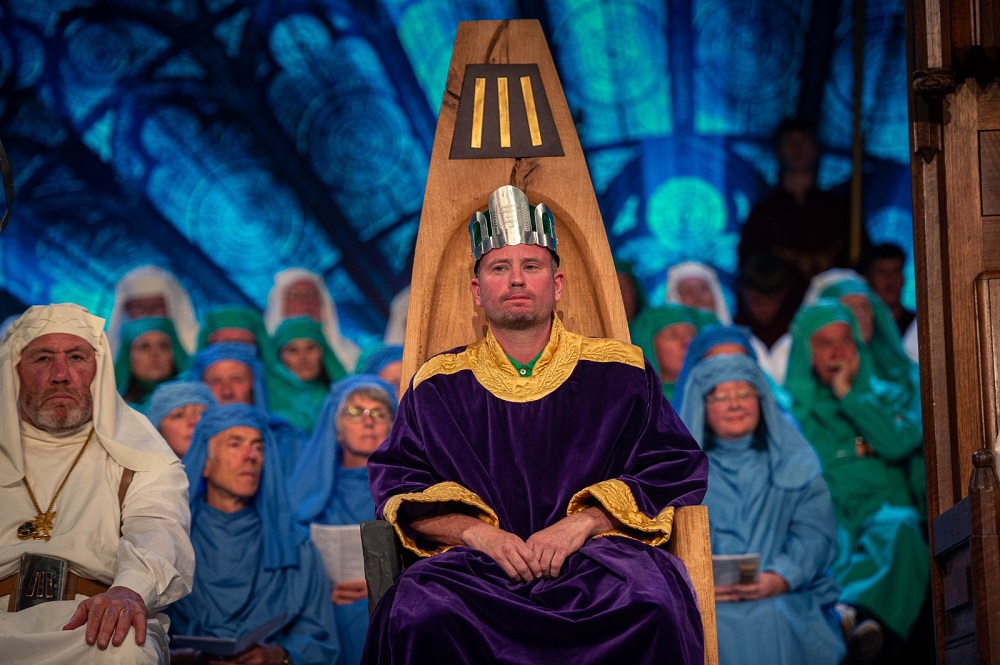Writer from Caernarfon wins the National Eisteddfod Crown

Rhys Iorwerth, a freelance writer and translator saw off stiff competition from 41 other poets to win the prestigious Crown at the 2023 National Eisteddfod.
Mr Iorwerth from Caernarfon was presented with the prize during a colourful Gorsedd of Bards ceremony in the pavilion led by Archruid of Wales Myrddin ap Dafydd.
Poets were invited to submit a ‘pryddest’ or collection of poems not in cynghanedd, of no more than 250 lines, on the subject of ‘Rhyddid’ (Freedom).
Writing under the nom de plume of Gregor the 40-year-old wrote a collection of poems about the global environmental crisis with an emphasis on the disaster in its local, family and specific Welsh aspects.
In his opening poem that there are references to the Menai Strait rising over the feet of the speaker’s ‘children’, and to the fact that ‘screams’ will be their ‘last Welsh’. Many aspects of freedom and slavery are said come into play in his poems.
The Crown was presented by the Caernarfonshire Branch of the Farmers’ Union of Wales with the financial prize of £750 donated by the Bryn Bodfel Family, Rhydyclafdy, in memory of Griffith Wynne. The Crown was designed and created by jeweller Elin Mair Roberts who lives in Y Ffor, just six miles from the Eisteddfod which is being held this year at Boduan on the outskirts of Pwllheli.
The adjudicators were Jason Walford Davies, Elinor Wyn Reynolds and Marged Haycock.
Powerful attraction
Presenting his adjudication Jason Walford Davies said: “It’s clear that being able to hold the title of ‘Crowned Poet of the Llyn and Eifionydd National Eisteddfod’ has been a powerful attraction, because forty-two candidates responded to this year’s challenge of compiling a poem or a collection of poems on Rhyddid.
“The reality is, of course, that this is a subject that offers a license to spread its wings. For my own part, I was struck by the lack of textuality of many of the competitors: as if many of the poets could not cope with such freedom, and therefore sought refuge in independence – an act which ultimately gave rise, ironically, to non-textual specificity.
“There are others, of course, who cling to the text like a dog by the bone.”
He and Elinor Wyn Rowlands placed four poets in the top category and all were said to be “fully worthy of the Crown”.
Mr Davies added: “One collection stands apart from the rest. Gregor expresses some of the same environmental concerns as Buan, and also voices the same middle-aged fears; but the voice is more mature, miraculously concise, and the thematic unity of the work is tighter.
“On top of this, Gregor is the best crafter of the competition, and has the firmest grip on the rhythmic requirements of poetry. It’s certain that the environmental and nebulous apocalypse imagined in this collection is that much more horrifying to be described in such a disturbingly quiet way.”
Mr Davies concluded: “The Llyn and Eifionydd National Eisteddfod gave rise to high competition beyond its standard, and on that basis this year’s winner deserves special credit.”
Lawn mower
Explaining how he chose Gregor as his pen name he said hours before sending the material to the Eisteddfod office, on the eve of celebrating his fortieth birthday, Rhys was mowing the lawn in the back garden.
“The machine he used was an electric, cordless, 33cm McGregor. Gregor was a ‘watchful’ or ‘alert’ man. Especially, perhaps, when concerned about the future of his flock or his children,” he said.
After scratching his head for a while, Rhys noticed that this would be his pseudonym.
Standing in the pavilion to the applause of the audience was not a new experience for Rhys Iorwerth. He won the National Eisteddfod Chair at the Wrexham and District National Eisteddfod in 2011.
He lives in his hometown, Caernarfon, wth his wife, Siwan, and his children Magw, three, and Idwal two, who are three and two years old.
Rhys Iorwerth has published two collections of poetry, a pamphlet of poems, a volume of prose, and several scripts for television and radio. He won the Book of the Year Poetry Award in 2015, the Michael Marks Award for Poetry in the Celtic Languages in 2020, and the Dic Jones Memorial Award for the best poem on Y Talwrn on BBC Radio Cymru three times.
The winning poem has been published on the Eisteddfod website and the Cyfansoddiadau a Beirniadaethau, which includes the full adjudication for the competition and the winners of all the other composition winners at this year’s Eisteddfod will be published at the end of the Chairing Ceremony on Friday afternoon.
Support our Nation today
For the price of a cup of coffee a month you can help us create an independent, not-for-profit, national news service for the people of Wales, by the people of Wales.






